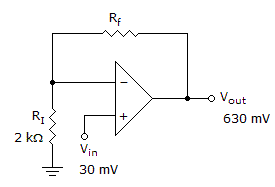Discussion
Home ‣ Electronics ‣ Operational Amplifiers Comments
- Question
A PLL can be used as a(n) ___________.
Options- A. series voltage regulator
- B. frequency multiplier
- C. relaxation oscillator
- D. Schmitt trigger
- Correct Answer
- frequency multiplier
- 1.

The feedback resistor has a value of ______ in the given circuit
Options- A. 2 kΩ
- B. 10.5 kΩ
- C. 21 kΩ
- D. 40 kΩ Discuss
- 2. A circuit that has an output equal to the algebraic sum of the inputs is called a(n) ______ .
Options- A. integrator amplifier
- B. summing amplifier
- C. differential amplifier
- D. voltage multiplier Discuss
- 3. If the input to a comparator is a sine wave, the output is a(n) _________.
Options- A. ramp voltage
- B. sine wave
- C. sawtooth wave
- D. rectangular wave Discuss
- 4. A ______ is not a multivibrator.
Options- A. one-shot
- B. flip-flop
- C. VCO
- D. bistable Discuss
- 5. An oscillator whose frequency can be controlled by an input "control voltage" is called a(n) ______ .
Options- A. PLL
- B. Schmitt trigger
- C. VCO
- D. S-R latch Discuss
- 6. Switching voltage regulators have ______ than linear regulators.
Options- A. longer life
- B. simpler circuitry
- C. greater efficiency
- D. lower cost Discuss
- 7. The efficiency rating of a power supply is determined by internal power loss.
Options- A. True
- B. False Discuss
- 8. Heat produced by a resistor is generally a desirable effect.
Options- A. True
- B. False Discuss
- 9. Doubling the voltage across a resistor will cut the current by half.
Options- A. True
- B. False Discuss
- 10. The current through a resistor can be found by dividing the resistor's voltage by its ohmic value.
Options- A. True
- B. False Discuss
Operational Amplifiers problems
Search Results
Correct Answer: 40 kΩ
Correct Answer: summing amplifier
Correct Answer: rectangular wave
Correct Answer: one-shot
Correct Answer: VCO
Correct Answer: greater efficiency
Correct Answer: True
Correct Answer: False
Correct Answer: False
Correct Answer: True
Comments
There are no comments.More in Electronics:
Programming
Copyright ©CuriousTab. All rights reserved.
